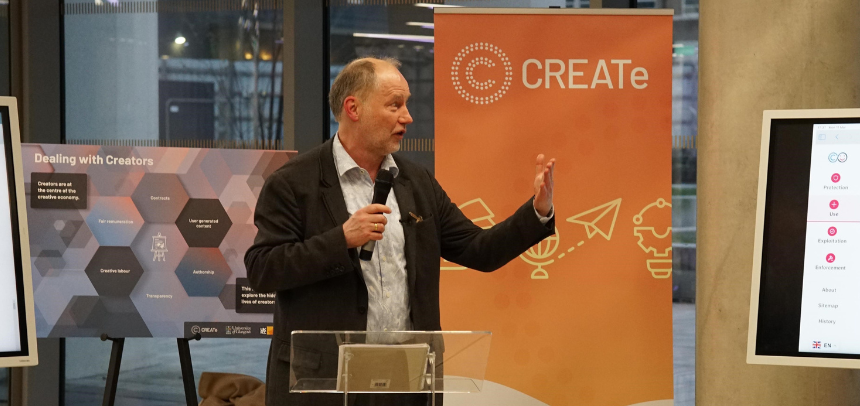CREATE Centre celebrates AHRC research infrastructure award
Published: 11 March 2024
The CREATe Centre at the University of Glasgow has received a major five-year research infrastructure award from the Arts and Humanities Research Council (AHRC).
The University of Glasgow's CREATe Centre has received a major five-year research infrastructure award from the Arts and Humanities Research Council (AHRC).
This will enable the Centre to develop capacity, policy resources and legal guidance with a focus on the Creative Economy.
CREATe celebrated the award at a 'relaunch' event held at the UofG's Advanced Research Centre (ARC) on 11 March. At ‘Centre for Regulation of the Creative Economy’, Professor Anu Bradford, Henry L. Moses Professor of Law and International Organization at Columbia University, discussed her recent book: ‘Digital Empires: The Global Battle to Regulate Technology. UofG's Principal and Vice-Chancellor Professor Sir Anton Muscatelli also spoke, describing CREATe as being "ideally positioned as a multi-disciplinary centre".

At the event, CREATe announced its agenda for the next five years with an exhibition of seven themes at the intersection of Creativity, Technology and Markets. These are Dealing with Creators; Legal History and Cultural Memory; The Law of Innovation; Automation, Decentralisation and Platforms; Access to Knowledge; The Political Economy of Digital Regulation; and Digital Technologies and Humanism.
This was followed by a discussion with regulators Ofcom, CMA (Competition and Markets Authority) and the Intellectual Property Office about new modes of regulation, the formal and informal coordination of responsibilities between regulators, and the UK’s geopolitical positioning.
Martin Kretschmer, Professor of Intellectual Property Law and Director of CREATe, said: “National creative economy and innovation policy is inexorably linked with intellectual property, markets and technology regulation as much as with cultural life and individual freedom. This is a delicate balancing act with high stakes for the UK and future generations. Academic research has an important role in supplying insight about the present and future impacts of new technologies and offer independent guidance and proposed solutions.
“As UK research infrastructure, CREATe will develop evidence and guidance resources, independent policy assessments and build capacity in one of key sectors for the UK economy.”
Professor Kristofer Erickson, Professor of Social Data Science, CREATe Co-Investigator and Deputy Director, said: “Examples of technological disruption include the impact of Artificial Intelligence on creative jobs, reflected in recent global labour disputes; the interface between new decentralised networks and traditional institutions; the resilience of platforms against manipulation, including by state and non-state actors; widespread embedding of software code in everyday consumer devices raising privacy, intellectual property and consumer protection issues. To have legitimacy, the policy process needs robust and transparent evidence.”
Dr Magali Eben, Senior Lecturer in Competition Law, CREATe Co-Investigator and Deputy Director, said: “Confronting the challenges of digital regulation responsibly requires a holistic approach and that diverse voices are at the table. As Professor Bradford’s keynote vividly illustrates, regulators, authorities and courts worldwide have to consider the impacts of global technology in the context of their local or regional priorities. These objectives tend to be diverse and interlinked – requiring an approach which marries the insights and tools of various areas of law and various disciplines.”
Professor Anu Bradford, Henry L. Moses Professor of Law and International Organization, Columbia University, New York, said: “The digital economy today is multifaceted and calls for analyses that spans across policy domains, jurisdictions, and scholarly disciplines. CREATe is ideally placed to make a significant contribution to some of the most important debates that shape our digital economies and societies.”
Dr Allan Sudlow, Director of Partnerships and Engagement, Arts and Humanities Research Council (AHRC), said: “There is an urgent need for an evidence-based legal and regulatory understanding of digital technologies such as AI that underpin our national strategies and key economic sectors such as the creative industries. CREATe contributes significant research to deliver expert advice to creators and innovators who wish to act responsibly and effectively in this rapidly moving environment.”
Professor Sir Anton Muscatelli, Principal and Vice-Chancellor of the University of Glasgow, said: “The University is very proud to host the UK Centre for Regulation of the Creative Economy (CREATe), which was one of the first large Centre investments by the Arts and Humanities Research Council (AHRC).
“Since its inception in 2013, CREATe has transformed the evidence base for copyright regulation and has strengthened interdisciplinary research across the fields of law, technology, creative industries and market regulation. In this era of Artificial Intelligence, advanced technologies and shifting regulatory landscapes, it is essential that Centres like CREATE are providing the robust evidence needed to inform policymaking and to support the creative industries and businesses to navigate the complex digital environment.”
First published: 11 March 2024

